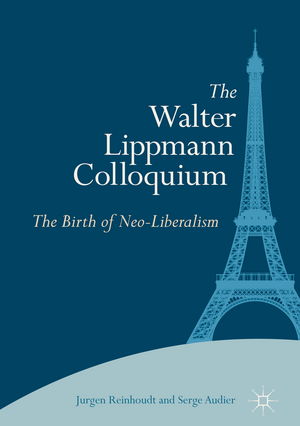The Walter Lippmann Colloquium: The Birth of Neo-Liberalism
Autor Jurgen Reinhoudt, Serge Audieren Limba Engleză Hardback – 2 noi 2017
| Toate formatele și edițiile | Preț | Express |
|---|---|---|
| Paperback (1) | 731.96 lei 38-45 zile | |
| Springer International Publishing – 4 sep 2018 | 731.96 lei 38-45 zile | |
| Hardback (1) | 1011.09 lei 6-8 săpt. | |
| Springer International Publishing – 2 noi 2017 | 1011.09 lei 6-8 săpt. |
Preț: 1011.09 lei
Preț vechi: 1233.04 lei
-18% Nou
Puncte Express: 1517
Preț estimativ în valută:
193.50€ • 200.48$ • 161.49£
193.50€ • 200.48$ • 161.49£
Carte tipărită la comandă
Livrare economică 21 martie-04 aprilie
Preluare comenzi: 021 569.72.76
Specificații
ISBN-13: 9783319658841
ISBN-10: 3319658840
Pagini: 212
Ilustrații: VIII, 212 p.
Dimensiuni: 148 x 210 x 21 mm
Greutate: 3.9 kg
Ediția:1st ed. 2018
Editura: Springer International Publishing
Colecția Palgrave Macmillan
Locul publicării:Cham, Switzerland
ISBN-10: 3319658840
Pagini: 212
Ilustrații: VIII, 212 p.
Dimensiuni: 148 x 210 x 21 mm
Greutate: 3.9 kg
Ediția:1st ed. 2018
Editura: Springer International Publishing
Colecția Palgrave Macmillan
Locul publicării:Cham, Switzerland
Cuprins
Part 1
Chapter 1 Introduction (by Reinhoudt & Audier)
Chapter 2 Colloquium Participants (by Reinhoudt and Audier)
Part 2 (translation by Reinhoudt)
Chapter 3 Foreword and opening lectures of the Walter Lippmann Colloquium
Chapter 4 Is the decline of liberalism due to endogenous causes?
Chapter 5 Liberalism and the war economy
Chapter 6 Liberalism and economic nationalism
Chapter 7 Liberalism and the social question
Chapter 8 Psychological and social causes, political and ideological causes of the decline of liberalism
Chapter 9 The agenda of liberalism
Chapter 10 The theoretical and practical problems of the return to liberalism
Part 3
References
Index
Notă biografică
Jurgen Reinhoudt is Research Associate in the Hoover Institution at Stanford University, USA
Serge Audier is Maître de Conférences in the Department of Philosophy at University of Paris-Sorbonne, France
Textul de pe ultima copertă
This book is a introduction to and translation of the 1938 Walter Lippmann Colloquium held in Paris, which became known the intellectual birthplace of “neo-liberalism.” Although the Lippmann Colloquium has been the subject of significant recent interest, this book makes this crucial primary source available to a wide, English-speaking audience for the first time. The Colloquium features important—often passionate—debates involving well-known intellectual figures such as Walter Lippmann, Louis Rougier, Friedrich Hayek, Ludwig von Mises, Michael Polanyi, Jacques Rueff, Alexander Rüstow and Wilhelm Röpke. The Colloquium is not only of historical importance. Many of the topics addressed at the Colloquium, such as the proper methods of economic intervention, the relationship between the market economy and democracy, and the relationship between economic liberalism and political liberalism are issues that still vie for our attention in the aftermath of the Great Recession.
v>
v>
Caracteristici
Provides the first available English translation of the Lippmann Colloquium, the formal birthplace of “neo-liberalism”
Places the Colloquium in its historical context; avoids a teleological interpretation
Explores themes developed in the Lippmann Colloquium that have an enduring relevance to contemporary economic and political liberalism, particularly in the aftermath of the Great Recession
Places the Colloquium in its historical context; avoids a teleological interpretation
Explores themes developed in the Lippmann Colloquium that have an enduring relevance to contemporary economic and political liberalism, particularly in the aftermath of the Great Recession
